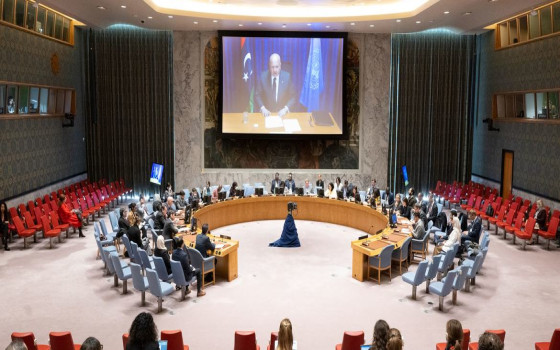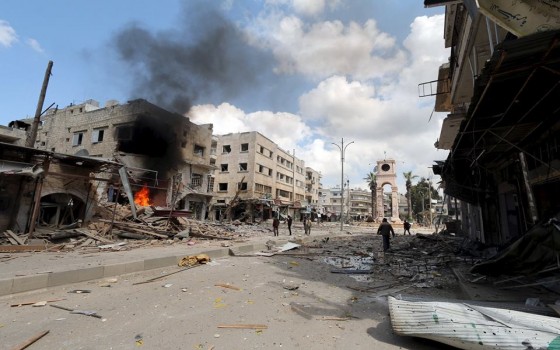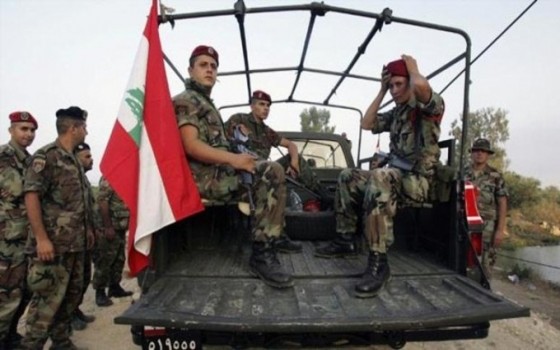
Libya.. The International Criminal Court: A glimmer of hope for achieving justice can spread more widely in the country

- Europe and Arabs
- Wednesday , 20 November 2024 8:1 AM GMT
Tripoli - New York: Europe and the Arabs
Karim Khan, the Prosecutor of the International Criminal Court, said that "a new model of progress" began with a visit he is currently making to Libya and the work of his office over the past six months, adding that his office is moving quickly across key lines of investigation, including with regard to crimes committed in detention facilities and other crimes related to operations that occurred between 2014-2020.
This came in his briefing to a session held by the UN Security Council yesterday, Tuesday, to discuss the situation in Libya, where he was speaking via video from Tripoli as part of his second visit to Libya. This is also the second time he has briefed the Security Council from Libya. According to what was reported in the UN daily news bulletin, a copy of which we received this morning, Wednesday
Khan spoke about his meeting with the families of the victims from Tarhuna, and his visit to "sites of deliberate cruelty, where people were subjected to unimaginable suffering, torture, execution and the disposal of their bodies in landfills." “But today, alongside this pain, I think we can collectively clearly feel a renewed hope. A renewed hope that has been built through our collective work towards accountability,” he added. He pointed to the arrest warrants issued for six members of the Kaniyat armed group who, according to the court, were responsible for crimes committed against people in Tarhuna.
“Through my Office’s tracking activities, and through our engagement with the Office of the Attorney General (in Libya), we have identified a number of these individuals who are accused of committing atrocities in Tarhuna. We know where they are. We need the help of States, and we need your help, to arrest them and to finally give the families I met today the opportunity to present their stories in court,” Khan said.
Justice on a broader scale
The prosecutor of the International Criminal Court, based in The Hague, Netherlands, said the report he is presenting to the Council today “shows that the glimmer of hope for justice that emerged in Tarhuna can spread more widely.” He explained that in light of the progress achieved, he expects to be able to submit a series of new requests for arrest warrants during the next reporting period, adding that his office continues and expands its cooperation with local authorities in pursuit of accountability for crimes committed against migrants in Libya, including in the form of a joint team.
He stressed that they are on track in implementing the roadmap he outlined in his last briefing, through which he intends to complete investigative activities by the end of 2025.
Establishing a new mechanism
Khan spoke about cooperation with the Libyan authorities, noting that during his current visit he had set a new path for cooperation. He stated that during his first meeting with the Libyan Attorney General, “we have taken some real steps forward in our joint work in terms of tracking down suspects and supporting concrete work in the form of trials, both at the International Criminal Court and before Libyan national courts.”
Khan announced that a new mechanism will be established to support the coordination of work between his office and the Attorney General’s Office across the areas of investigations, prosecutions and integration. He noted that his team continues to engage with the relevant authorities in eastern Libya, confirming his readiness to visit the east of the country on his next mission to Libya. Engagement with Civil Society
The ICC Prosecutor touched on engagement with Libyan civil society, adding that “as we move towards the completion of the investigation phase, it is essential that we hear their voices more clearly in our work.”
He reported that in the past six months alone, the Unified Team for Libya had met with over 70 civil society organizations and human rights defenders to discuss their work and the contributions they can make to the Office’s investigations.
He added that two new initiatives had been developed to further strengthen his Office’s structural engagement with civil society in the past period.
Khan stressed that the completion of the investigation phase “does not mean that we are withdrawing. My Office will continue to work intensively and focused to bring trials under the orders of the ICC, and will engage extensively, in a complementary manner with national authorities and their civil society counterparts in Libya.”
The ICC Prosecutor cautioned that “the hope I felt today with the families of Tarhuna should not be taken as naive. We know and continue to face the very significant challenges affecting so many in Libya. Political uncertainty, insecurity, and technical capacity challenges must be addressed simultaneously.”
He believed that today in particular seemed like it could mark the beginning of a new phase of trust and shared purpose.












No Comments Found